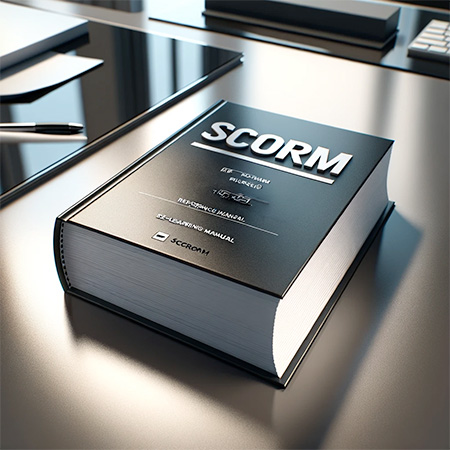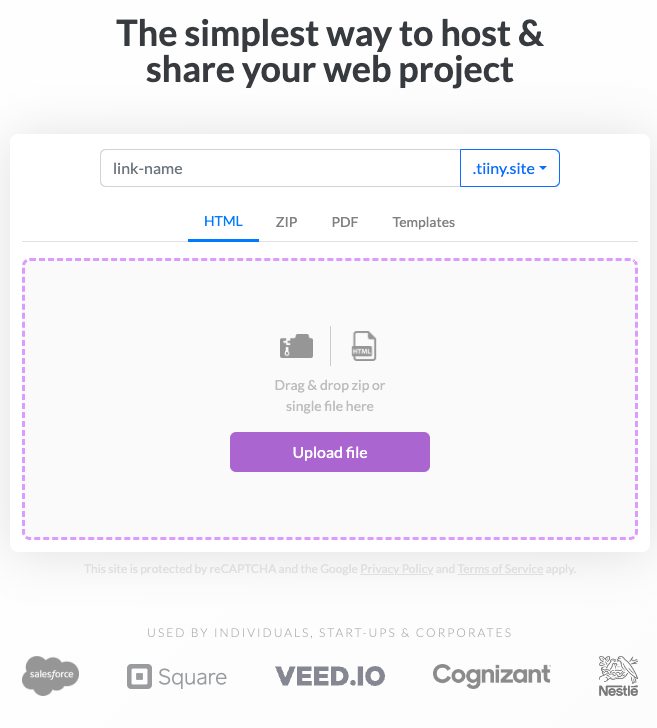- What is SCORM?
- How do I create a SCORM-compatible training module?
- Can I use a static webserver to host SCORM modules?
- What are the limitations of a static server?
- What are the benefits of API-based LMSs?
- Where should I host my SCORM training modules?
- How do I host and share my SCORM training module with Tiiny.host?
- How do I share my training module website with Tiiny.host?
- Next steps
- FAQ: Host Online Training
SCORM? What’s that?
If you’re reading this, you may already know that SCORM is an important online training and hosting standard.
Once an e-learning professional begins planning their next interactive module, they’ll soon need to know how and where to host and share the training when the module is complete.
We’ll look at what all this means. Plus, how to host SCORM-compatible training modules in the simplest, most professional manner.
Let’s begin with SCORM.
What is SCORM?
SCORM (Sharable Content Object Reference Model) is a set of technical standards for e-learning software products. SCORM is an industry standard for sharing training modules across diverse platforms with near-total compatibility.
As of 2023, the latest version of the SCORM standard is SCORM 2004 4th Edition.
SCORM addresses:
- Advanced sequencing and navigation.
- The basic data model.
- The content aggregation model.
- The runtime environment.
It’s the runtime environment we’re concerned with now. After developing an online training module in a SCORM-compatible authoring system, we need to know how to host and share it. That’s where the compatibility of web servers comes into play.

How do I create a SCORM-compatible training module?
This article doesn’t cover creation in detail. Briefly, here is what you should be aware of when designing an online training module.
- Understand the SCORM standards.
- Create the content, including interactive elements.
- Use an authoring tool.*
- Test and debug thoroughly.
- Package and deploy your module in SCORM-compliant mode.
- Document your module and offer learner support.
*RECOMMENDED ARTICLE: 6 Free Elearning Authoring Tools for Training and Education.
Can I use a static webserver to host SCORM modules?
Yes. Static web servers can serve SCORM packages as they are essentially a collection of static files like HTML, CSS, JavaScript, and media files.
Static servers are less expensive to run than traditional servers, are more secure, and are faster at serving your web pages.
What are the limitations of a static server?
There are some limitations to hosting SCORM training modules on a static server. Or, you may see these limitations as benefits.
Let me explain.
The primary limitation is the inability to track and report learner progress and scores. SCORM relies on a Learning Management System (LMS) to handle dynamic interactions for tracking and scoring. Static servers don’t support the computer processing that these interactions require. Static servers deliver static content.
Why call this limitation a benefit? Simple.
SCORM uses static e-learning content. You can host the SCORM package on a static server:
- If you don’t need to track learners’ progress or scores.
- If you integrate your SCORM package with an API-based (“headless”) LMS.
A headless, API-based LMS integrated with static SCORM content gives you the best of both worlds. You get learner interactivity, tracking, and scoring, plus fast, secure, less-expensive hosting.
What are the benefits of API-based LMSs?
Using API-based LMSs is often referred to as the “API-first approach.” The benefits of this design include:
- An API-first approach allows seamless integration with other systems and applications, like your unique SCORM app.
- You can customize these systems and build new apps on top of the LMS structure. Your SCORM app is an example of this.
- API-based LMSs are scalable and efficient. They can handle large numbers of learners and vast amounts of content.
Examples of API-based LMSs are:
- TalentLMS: Known for its user-friendly interface and robust API capabilities.
- LearnUpon: Offers extensive API support for integration with other systems.
- Docebo: Provides a flexible API for customization and integration.
- Canvas LMS: Popular in the educational sector, known for its open API.
API-based LMSs are particularly useful for organizations requiring customization, integrating the LMS with other systems (like your SCORM package), or creating a unique user experience.
I recommend integrating your SCORM training module with an API-first approach. The benefits are significant.
Where should I host my SCORM training modules?
We have a suggestion.
Our service, Tiiny.host, fully supports the API-first approach to online training. This means that your SCORM package can be zipped and uploaded directly. For free. For as long as your account is active.
Your package will access the API seamlessly through the internet. You benefit from the interactivity, testing, and scoring of the API.
You also take advantage of the fastest, most secure, and simplest way to host a training module on the web.
I’ll show you how it works.
How do I host and share my SCORM training module with Tiiny.host?

Now, only three steps are required.
- Give your new website a name.
- Drag and drop your zipped training module onto the purple form.
- Click the “Upload file” button, sign in, or register for your free account.
That’s it. In moments, you’re online and ready to share.
How do I share my training module website with Tiiny.host?
Your free account offers all you need to share your new website with the world.
- Unique URL: A unique web address is assigned to your website using the name you entered in the upload form. You can share this URL through email, on social media, in communities and forums, and wherever you can post URLs.
- QR code: One click generates A QR code in your account dashboard. Share this graphic QR code, which has your URL embedded, anywhere that people may wish to scan it using their phone. Locations include television or video, documentation, and printed matter such as business cards, journals, or correspondence.
Next steps
You may have questions about what you’ve read here. Or about the entire hosting and sharing process. SCORM authoring and production often generate many questions.
Our incredible customer service is offered free of charge, just like our free, one-website subscription level.
Visit Tiiny.host/help to reach us by chat or email. We are eager to help you on your journey.
If you wish to increase your professional image by using custom domains, increase security through password protection, or edit your files online, we can help you there, too.
Visit Tiiny.host/pricing for the latest descriptions of available advanced features and subscription pricing.
Visit Tiiny.host today to check us out. We’re here for you.
FAQ: Host Online Training
What is SCORM, and how is it relevant to hosting online training?
SCORM (Sharable Content Object Reference Model) is a technical standard for e-learning software. It ensures compatibility between e-learning content and Learning Management Systems (LMS), making it a crucial standard for hosting and sharing online training modules.
What are the requirements for a server to host SCORM modules?
To effectively host SCORM modules, a server should ideally be integrated with an LMS that supports SCORM standards. This allows the server to handle the dynamic data exchange necessary for tracking learner progress and other interactions. Static web servers using an API-first approach are recommended.
Can SCORM modules be accessed on mobile devices?
Yes, but this depends on the LMS and the design of the SCORM module. Many modern LMS platforms are mobile-friendly, and SCORM modules can be designed to be responsive. Research this carefully. It’s a crucial issue in most cases.



